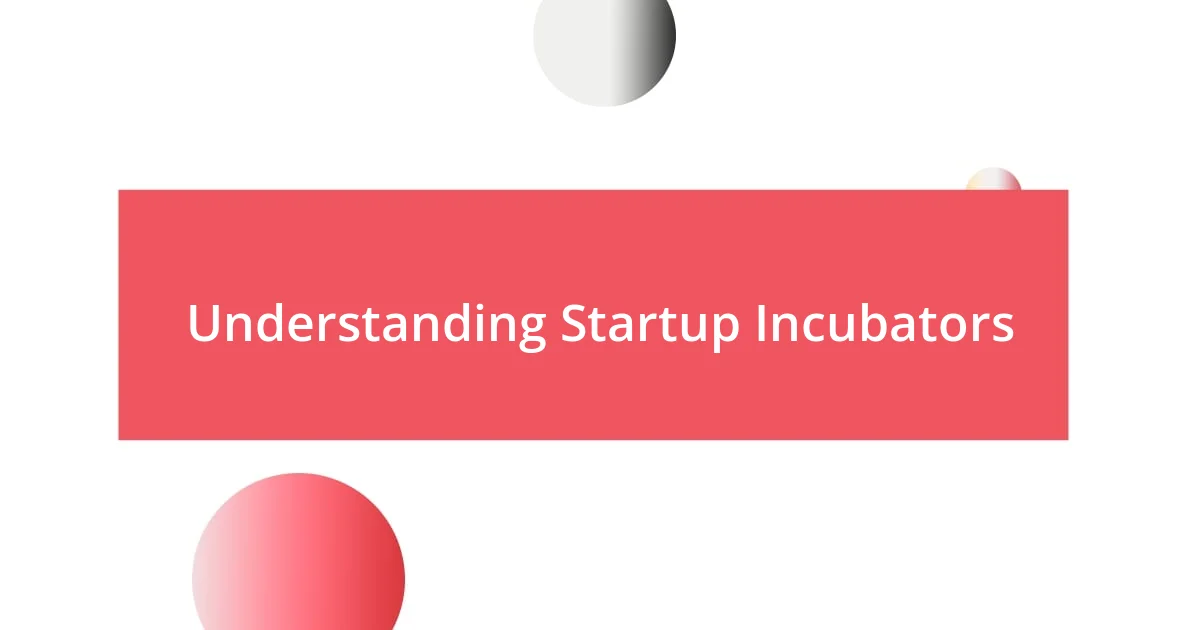Key takeaways:
- Startup incubators provide structured support, including mentorship, resources, and networking opportunities, significantly enhancing entrepreneurs’ chances of success.
- Key features of successful incubators include strong mentorship, a collaborative community, and tailored access to resources, fostering an innovative environment for startups.
- Future trends in incubation focus on technology integration (like AI), remote models for global access, and prioritizing mental wellness, all of which aim to create a more supportive and effective entrepreneurial ecosystem.

Understanding Startup Incubators
Startup incubators are more than just shared office spaces; they are vibrant ecosystems designed to nurture entrepreneurial dreams. I remember attending a pitch night at one such incubator, feeling the buzz of energy reverberating through the room. It dawned on me how a supportive environment can make all the difference for an entrepreneur trying to find their way.
Each incubator typically offers a structured program that includes mentorship, resources, and networking opportunities. The first time I participated in a mentorship session, I realized that the feedback I received was not just valuable, but also deeply personal. It felt like having someone genuinely invested in my success, which is a powerful motivator.
Rhetorically speaking, what would you give for a chance to accelerate your startup journey with experienced guides by your side? I’ve often found that the connections made in incubators can lead to partnerships and collaborations that extend far beyond the incubator walls, creating a ripple effect of opportunities. This is what makes understanding the role of startup incubators so essential; they turn ideas into thriving realities.

Benefits of Joining Incubators
Joining a startup incubator can offer a myriad of benefits that significantly elevate the chances of success for emerging entrepreneurs. From my experience, the mentorship provided is invaluable; having seasoned professionals who genuinely care about your growth is a game changer. I often think back to a session where a mentor shared their own failures and successes. It made me realize that learning from someone else’s journey could save me countless missteps along my own path.
Here are some specific benefits of joining incubators:
– Access to Resources: Many incubators provide funding, office space, or tools that startups might not afford independently.
– Networking Opportunities: The connections you make can lead to partnerships, investor meetings, and access to a wider entrepreneurial community.
– Structured Guidance: With well-designed programs, incubators outline actionable steps, saving you from the confusion of figuring things out alone.
– Accountability and Support: Being part of a cohort can keep you motivated, pushing you toward your goals with a built-in support system.
– Tailored Feedback: The individualized attention allows for feedback that is specifically relevant to your ideas, which can profoundly impact your development.
Having gone through the incubator experience myself, I can attest to how comforting it is to be part of a collective journey. You share highs and lows with fellow entrepreneurs, creating lasting relationships that often extend well beyond the program itself.

Key Features of Successful Incubators
Successful startup incubators share several key features that empower entrepreneurs to thrive. One essential component is a strong mentorship network. I fondly recall my first interaction with a mentor at an incubator—he not only offered sage advice but also shared stories that humanized the challenges of entrepreneurship. This emotional connection made me feel understood and motivated me to push through uncertainties.
Additionally, a collaborative community is vital. The atmosphere in a well-run incubator often fosters camaraderie, driving innovation and creativity. I remember brainstorming sessions that flowed effortlessly, where ideas bounced off one another like a joyful game of ping pong. Being surrounded by like-minded individuals not only bolsters confidence but also sparks unexpected collaborations that can elevate projects in ways I hadn’t anticipated.
Furthermore, access to relevant resources and funding is crucial for any startup’s success. Many incubators provide tailored resources based on the specific needs of each startup. I experienced this first-hand when an incubator introduced me to potential investors who aligned perfectly with my vision. This kind of support can truly set a startup on the path to success while removing many hurdles that entrepreneurs often face alone.
| Key Features | Description |
|---|---|
| Strong Mentorship | Guidance from experienced professionals who provide personalized advice and emotional support. |
| Collaborative Community | An environment that encourages networking and sharing of ideas, fostering creativity and partnerships. |
| Access to Resources | Provision of tools, funding, and connections tailored to the startup’s needs to facilitate growth and scalability. |

Common Challenges in Incubation
Nothing is ever perfect, and even the best incubators face their fair share of challenges. One common issue I’ve observed is the misalignment between a startup’s goals and the incubator’s resources. I still remember the time I found myself in a program that wasn’t quite tailored to my niche. It felt frustrating, as I was eager for guidance but had to sift through irrelevant advice. Have you ever felt like you were in the wrong place despite everyone’s best intentions? It’s an all-too-familiar feeling for many entrepreneurs.
Another significant hurdle is the dependency on mentorship. While having experienced mentors is immensely beneficial, relying too heavily on their guidance can stifle a startup’s unique voice. I witnessed this during one of my incubator sessions, where a peer was praised for mimicking a mentor’s approach rather than honing their own ideas. This raised a question for me: how do we strike the right balance between accepting feedback and staying true to our vision? It’s a delicate dance, and I believe it requires a conscious effort to embrace our individual perspectives.
Lastly, the competition within an incubator can sometimes become overwhelming. When you’re surrounded by ambitious, talented individuals, it’s easy to feel like you’re falling behind. I recall one pitch night when the energy was electric, but instead of pushing me to excel, it made my heart race with anxiety. It begs the question: how can we transform that competitive spirit into constructive motivation instead? Recognizing that each entrepreneur’s journey is unique can help foster a more supportive environment, making challenges feel less isolating.

Measuring Incubator Success
Measuring the success of startup incubators can be a nuanced endeavor. One effective method is tracking the number of startups that achieve funding or scale after completing the program. I remember a cohort I was part of where nearly half the startups secured meaningful investments. It felt like a celebratory victory, reinforcing a sense of purpose within the incubator. Isn’t it inspiring to see tangible results emerge from collective effort?
Another indicator often discussed is the growth in the entrepreneur’s skill set. Personally, I noticed a significant shift in my own abilities in areas like pitching and strategic planning. Incubators can provide workshops and hands-on experiences that truly refine these essential skills. When I look back, it’s clear that my confidence soared every time I successfully navigated a tough business challenge during those sessions. Doesn’t growth mean more than just data on a page?
Lastly, alumni success stories serve as powerful measures of an incubator’s effectiveness. I still recall the excitement when a past participant shared their journey of scaling a startup from a small idea to a thriving business. Those stories not only motivate current entrepreneurs but also create a sense of legacy within the incubator. They emphasize the impact of community support and validation, reminding us all that the journey, while personal, is also communal. Isn’t that what makes entrepreneurship so rewarding?

Future Trends in Startup Incubation
As I look ahead, I see startup incubators increasingly embracing technology to enhance their offerings. The integration of artificial intelligence for personalized mentoring is a fascinating trend. I remember experimenting with an AI-driven platform that provided tailored advice based on my startup’s unique challenges. It felt like having a mentor available 24/7, and it made me wonder—could this form of guidance become the norm rather than the exception?
Moreover, the rise of remote incubation models is transforming the landscape. I participated in a virtual incubator program during the pandemic, and it opened my eyes to a more global perspective on entrepreneurship. Isn’t it exciting to think about the diverse insights and networks you can access from anywhere in the world? This shift not only broadens the reach for eager startups but also fosters a rich exchange of ideas that can spark innovation.
Finally, I’m intrigued by the growing emphasis on mental wellness within incubation programs. I’ve seen firsthand how the pressures of startup life can weigh heavily on founders, and some incubators are now incorporating wellness initiatives into their frameworks. It left me feeling validated when a program I was involved in offered mindfulness sessions alongside business workshops. Doesn’t prioritizing mental health ultimately lead to more resilient entrepreneurs? Embracing vulnerability and self-care may be the key to sustainable success in the long run.












